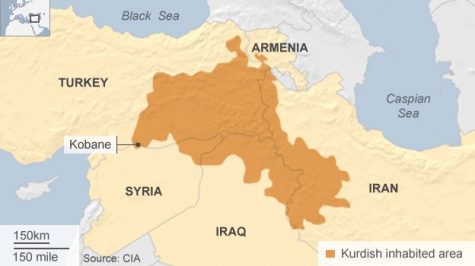Trump and the Kurd’s explained
Isabel Knipping Staff Writer
According to the BBC News, the Kurd’s are indigenous people from mountainous regions in Turkey, Iraq, Syria, Iran, and Armenia. Syrian Kurd’s used to belong to multiple different political parties’ movements, according to Vox news. But in 2011, when the Syrian Civil War broke out.the Kurdish Democratic Party( also known as the PYD) began.The PYD stems the PKK, a Turkish insurgent that’s fighting against the Turkish government. The Kurd’s in Syria began helping the United States fight ISIS in 2014. The Obama administration gave the Syrian Democratic support and training. They wanted the Syrian Kurd’s to have restricted engagement with US troops but still be able to conquer ISIS. This partnership between the Syrian Kurd’s and the United States made Turkey and the United States’ relationship uneasy. The Kurd’s in Syria have connections to the PKK. The United States, European Union, and others have categorized the PKK as a terror group. Trump removed troops from Syria and then Turkey airtsricked Syria.
President Trump defended Turkey to attack Syria and the Kurd’s. According to CNBC news, he said, “They didn’t help us in the second World War;They didn’t help us with Normandy,” referring to the Kurd’s. They’re there to help us with their land, and that’s a different thing.” His abandonment of the Kurd’s drew criticism from both sides of the political aisle. According to CNBC news writer Natasha Turak, “some 11,000 Kurdish forces died assisting the U.S. in the counter-ISIS campaign in Syria, and high-ranking U.S. diplomats and military officials credit much of the victory over the extremist group to the Kurdish fighters.” Democratic senator Chris Van Mollen from Maryland and Republican senator Lindsay Graham presented a bipartisan bill to the senate that would punish Turkey with sanctions for invading Syria.
So what does this mean for ISIS? According to Vox news, about 11,000 detained ISIS terrorists, which includes about 2,00 foreign fighters are being guarded by the Syrian Democratic forces. ISIS no longer controls a lot of territory, but it’s morphed into an insurgency movement and remains a serious threat to the stability of both Iraq and Syria. The Department of Defense warned in August that a US drawdown of troops risked an ISIS resurgence, according to Vox news writer Jen Kirby. ISIS could take advantage of what’s happening and form again.

Courtesy of BCC news


